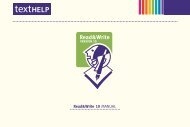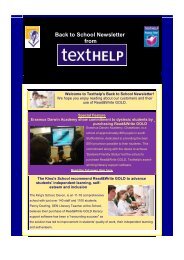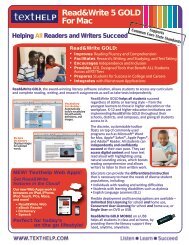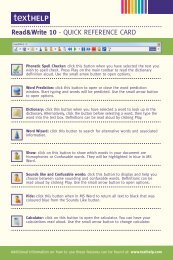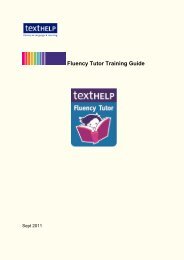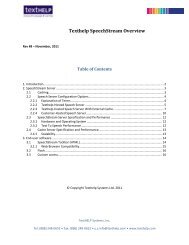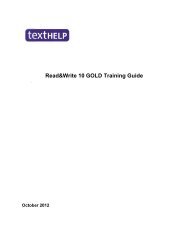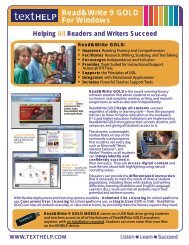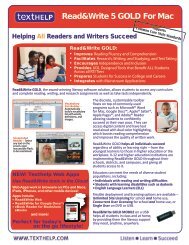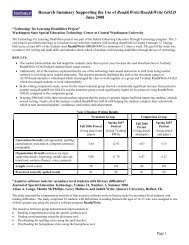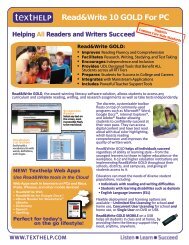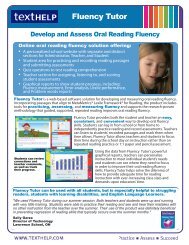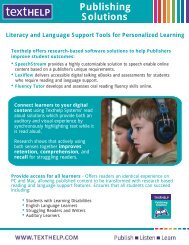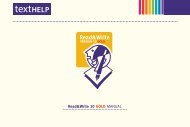01 NRDC Dyslexia 1-88 update - Texthelp
01 NRDC Dyslexia 1-88 update - Texthelp
01 NRDC Dyslexia 1-88 update - Texthelp
Create successful ePaper yourself
Turn your PDF publications into a flip-book with our unique Google optimized e-Paper software.
78<br />
Research Report<br />
procedural knowledge of a different kind) to type the word on a keyboard and to do so<br />
automatically when the idea of the word enters their heads. Procedural knowledge relies on<br />
sensorimotor protocols. By definition, these protocols are not established in people who do<br />
not write; they must be put in place and it is ‘never too late to do so’ (McGuinness, 1998).<br />
There is no novelty in the use of multisensory methods with adult newcomers to literacy;<br />
tactile methods were used in the mass education movement of the early nineteenth century<br />
(Dickson, 1986). Nor should there be any mystique about this, for although reading and<br />
writing draw on shared knowledge they are separate skills and writing needs to be learned<br />
by—as well as with—the hands (Berninger et al., 2002).<br />
Simple component skills also need to become fluent, if they are to be successfully combined<br />
in more complex cognitive operations (Johnson & Layng, 1992). In fluent spelling, for<br />
example, the learner will be able to spell words swiftly enough not to lose momentum,<br />
remember how to spell words after a significant period of no practice and spell them<br />
correctly when concentrating on the subject of a composition in which they are used (Johnson<br />
& Layng, 1992). The components of mathematical problem-solving procedures can be<br />
similarly modelled. All procedural learning needs to be thoroughly assimilated by drill, or<br />
overlearning (Kohl, 19<strong>88</strong>; Oakland et al., 1998), in order to establish new and active networks<br />
of neural connectivity; the more extensive these networks become, the more easily the new<br />
learning can be applied. Dysfluent component skills make progress impossible at worst and<br />
tedious at best (Johnson & Layng, 1992), but there is evidence that computer-supported<br />
teaching can make drill acceptable to literacy learners (Cromley, 2000; Singleton & Simmons,<br />
20<strong>01</strong>).<br />
Then, since critical developmental changes result from adequate language experience in<br />
naturalistic contexts, it has been suggested that intervention strategies for learners with<br />
language learning problems should focus on enhancing language experience in natural<br />
contexts (Nittrouer, 2002). One way of doing so with adult students might be to base teaching<br />
on directly relevant materials such as small advertisements in the local newspaper or workrelated<br />
vocabulary; building up a sight vocabulary related to life-experiences and interests<br />
might be a useful first step toward functional literacy (Gottesman et al., 1996).<br />
The tutor’s aim must be to impart declarative knowledge (knowledge that) and to ensure that<br />
the student then transforms it into procedural knowledge (knowledge how) that can be drawn<br />
upon without conscious attention.<br />
Students will not become proficient without repetitive practice.<br />
Computer-supported instruction can make repetitive practice acceptable to adult students.<br />
Agents<br />
Who should be entrusted to fire this grapeshot? It is sometimes argued that this role should<br />
be undertaken by specialists in dyslexia, which is a critically important safeguard if the<br />
alternative is to assign the task to untrained volunteers. But it does not follow that expertise<br />
in the teaching of reading should be the monopoly of specialists who are called in when things<br />
go wrong. From nursery school onwards, everyone who teaches literacy needs to be<br />
knowledgeable about language and language learning (Brooks et al., 20<strong>01</strong>a; Brooks et al.,<br />
1992; Locke et al., 2002; Mather et al., 20<strong>01</strong>; Moats, 1994; Moats & Lyon, 1996). The<br />
professional development of adult literacy teachers might helpfully be understood by analogy



